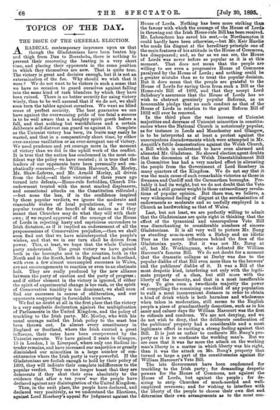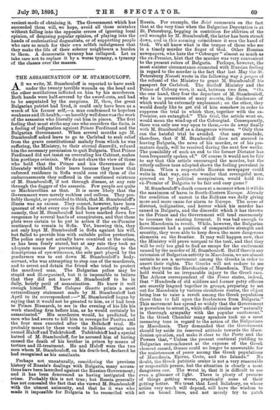TOPICS OF THE DAY •
THE ISSUE OF THE GENERAL ELECTION.
ARADICAL contemporary impresses upon us that though the Gladstonians have been beaten hip and thigh from Dan to Beersheba, there is nothing to prevent their recovering the beating in a very short time, and placing their opponents in the same position in which they themselves are now. That is quite true. The victory is great and decisive enough, but it is not an extermination of the foe. Why should we wish that it were ? We do not want to be victors in such a sense that we have no occasion to guard ourselves against falling into the same kind of rash blunders by which they have been ruined. There is no better security for using victory wisely, than to be well assured that if we do not, we shall soon turn the tables against ourselves. We want no blind sense of perfect security. The best guarantee we can have against the overweening pride of too fatal a success is to be well aware that a haughty spirit goeth before a fall, and that nothing but watchfulness and a certain deliberate self-distrust can guard us against it. Complete as the Unionist victory has been, its fruits may easily be wasted, and that in a comparatively short time, by either over-anxious vacillation or an over-arrogant use of victory. We need prudence and yet courage more in the moment of victory than we did in the uphill work of the conflict. It is true that the nation has condemned in the most con- fident way the policy we have resisted ; it is true that the leaders of our opponents have been personally and em- phatically censured,—Sir William Harcourt, Mr. Morley, Mr. Shaw-Lefevre, and Mr. Arnold Morley, all driven from the field,—all their victories of three years ago turned into defeats,—Home-rule forbidden, Church Dis- endowment treated with the most marked displeasure, and sensational attacks on the Constitution ridiculed ; —but none the less, if in the confidence inspired by these popular verdicts, we ignore the moderate and reasonable wishes of local populations, if we treat popular trusts for the benefit of the nation as if they meant that Churches may do what they will with their own ; if we regard approval of the courage of the House of Lords in rejecting hasty and capricious surrenders to Irish dictation, as if it implied an endorsement of all the prepossessions of Conservative prejudice,—then we shall soon find out that we have misinterpreted the people's wishes, and that we in our turn shall be driven from power. This, at least, we hope that the whole Unionist party understand. The great victory we have gained both in the boroughs and in the counties, both in the North and in the South, both in England and in Scotland, with even a few almost unexampled successes in Wales, are not encouragements to reaction or even to an obstinate halt. They are really produced by the new alliance between the party of caution and the party of progress ; and if either element in the victory is ignored, if either the spirit of experimental change is too rash, or the spirit of Conservative timidity is too dominant, we shall soon find our successes in course of obliteration, and our opponents reappearing in formidable numbers.
We feel no doubt at all in the first place that the victory is a very emphatic declaration akainst the multiplication of Parliaments in the United Kingdom, and the policy of truckling to the Irish party. Mr. Morley, who with his usual courage nailed the Irish policy to the mast has been thrown out. In almost every constituency in England or Scotland, where the Irish exerted a great influence, their votes have been overpowered by the Unionist recruits. We have gained 2 seats in Glasgow, 15 in London, 1 in Liverpool, where only one Radical in- truder remains, and have increased our majorities or greatly diminished our minorities in a large number of con- stituencies where the Irish party is very powerful. If the Gladstonians are foolish enough to hold by their policy of 1893, they will indicate their complete indifference to the popular verdict. They can no longer boast that they are democrats if they shut their eyes absolutely to the evidence that after a ten years' war the people have declared against any disintegration of the United Kingdom. Then, in the next place, the people have declared, and declared very positively, as we understand the Elections, against Lord Rosebery's appeal for judgment against the House of Lords. Nothing has been more striking than the favour with which the courage of the House of Lords in throwing out the Irish Home-rule Bill has been received. Mr. Labouchere has saved his seat,—in Northampton it could hardly have been otherwise,—but Mr. Keir Hardie' who made his disgust at the hereditary principle one of the main features of his attitude in the House of Commons, has disappeared; and, so far as we can see, the House of Lords was never before so popular as it is at this. moment. That does not mean that the people are- willing to see even a progressive House of Commons paralysed by the House of Lords ; and nothing could be a greater Mistake than so to treat the popular decision. But it does mean that the people are grateful to the House of Lords for saving them from such a Bill as the Home-rule Bill of 1893, and that they accept Lord Salisbury's assurance that the House of Lords has no wish to obstruct genuinely popular Reforms, as an honourable pledge that no such conduct as that of the House of Lords in relation to the great Reform Bill of 1832 will ever be renewed.
In the third place the vast increase of Unionist majorities and decrease of Unionist minorities in constitu- encies where the National Church is notoriously popular, as for instance in Leeds and Manchester and Glasgow, is to be interpreted as at least a protest against the unscrupulous disendowments which were attempted in Mr. Asquith's futile demonstration against the Welsh Church, a Bill which is understood to have even alarmed and alienated Mr. Gladstone. No shrewd election agent doubts that the discussion of the Welsh Disestablishment Bill in Committee has had a very marked effect in alienating the people from the Government of Lord Rosebery in many quarters of the Kingdom. We do not say that it was the main cause of such remarkable victories as those in Swansea and Cardiff and the Carmarthen boroughs. Pro- bably it had its weight, but we do not doubt that the Veto. Bill had a still greater weight in those extraordinary revolu- tions of popular opinion. But there was, we believe, a. very widespread feeling of disgust at the secularisation of endowments so moderate and so usefully employed in a Church as hardworking as that of Wales.
Last, but not least, we are perfectly willing to admit that the Gladstonians are quite right in thinking that the effect of the tyrannical and unscrupulous Veto BM was disenchanting to considerable numbers of sincere G-ladstonians. It is all very well to picture Mr. Bung as standing arm-in-arm with a Bishop and an idiotic Peer as the secret influences behind the foes of the Gladstonian party. But it was not Mr. Bung at all, but Mr. Workingman, who defeated Sir William Harcourt's famous Bill. We do not doubt for a moment that the dramatic collapse at Derby was due to the popular dislike of that Bill even more than to the brewers' and the publicans' dislike of it. It was a Bill of the most despotic kind, interfering not only with the legiti- mate property of a class, but still more with the liberty of the minority, and that in a most insufferable way. To give even a two-thirds majority the power of compelling the remaining one-third of any population to walk a most inconvenient distance in order to obtain a kind of drink which is both harmless and wholesome when taken in moderation, still seems to the English people a piece of grandmotherly despotism, such as in his saner and calmer days Sir William Harcourt was the first to ridicule and condemn. We are not denying, and we do not wish to deny, that the deliberate confiscation of the publicans' property had a considerable and a most legitimate effect in exciting a strong feeling against that Bill. It is just as unfair to confiscate Mr. Bung's pro- perty as it is to confiscate the working man's. But we are sure that it was far more the attack on the working man's liberty in a matter in which liberty was his right, than it was the attack on Mr. Bung's property that turned so large a part of the constituencies against Sir William Harcourt's Veto Bill.
The late Government have been condemned for truckling to the Irish party ; for demanding despotic powers for the House of Commons, not against the House of Lords, but against the people ; for de- siring to strip Churches of much-needed and well- employed revenues ; and for wishing to interfere with the liberty of the people to choose their own diet and determine their own arrangements as to the most con- venient mode of obtaining it. The Government which has succeeded them will, we hope, avoid all these mistakes without falling into the opposite errors of ignoring local .opinion, of despising popular opinion, of playing into the hands of ecclesiastical dogmatists, or of supporting people who care so much for their own selfish indulgences that they make the life of their soberer neighbours a burden to them. A democratic tyranny has collapsed. Let us take care not to replace it by a worse tyranny, a tyranny of the classes over the masses.



































 Previous page
Previous page